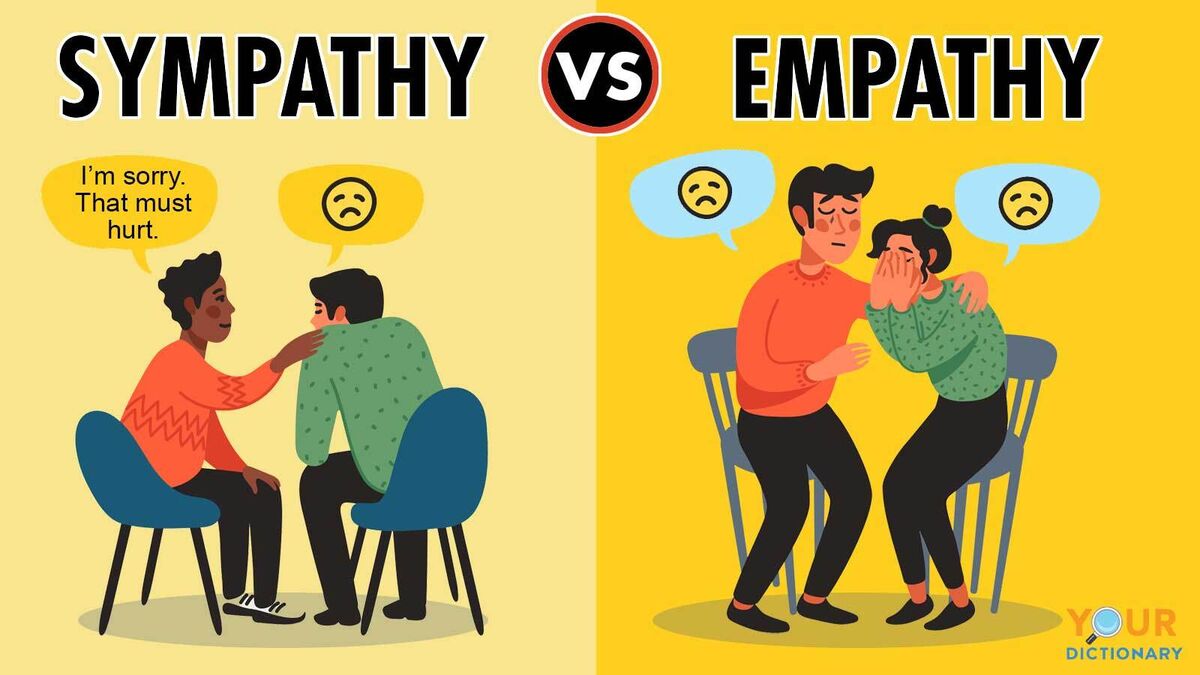
What's the difference between sympathy and empathy? At the most basic level, sympathy is feeling sorry for someone, while empathy is understanding their pain. These words are related, but they are not synonyms. Discover the differences between empathy vs. sympathy so you can be confident in your ability to use these two words correctly.
Different Definitions: Sympathy vs. Empathy
While the words sympathy and empathy both describe feelings, their meanings are quite different.
Sympathy Meaning
Sympathy involves feelings of compassion, sorrow, sadness, or pity for another person or other people who are facing difficult circumstances. It is an emotion experienced in reaction to something that happens to other people. When you feel sorry for someone, you have sympathy for that person.
When someone loses a loved one, it is common to feel sympathy towards that person and their family. Condolence messages are often used to express sympathy. You can have sympathy (noun) for someone or you can sympathize (verb) with them.
Empathy Meaning
Empathy is stronger than sympathy. It goes beyond feeling compassion for their loss. It is the ability to put yourself in the place of another and understand someone else's feelings by identifying with them. With empathy, you put yourself in another's shoes and view the situation through their eyes to get a real sense of what their experience is like. Rather than just feeling bad for the other person, showing empathy involves sharing their feelings.
- A person has empathy if they can realistically perceive how the other person is feeling and share those feelings, even if they haven’t experienced a similar situation.
- Someone lacking empathy may not be able to understand why another person is upset over a situation if they cannot or will not imagine themselves in that person's place.
You can have empathy (noun) for someone or you can empathize (verb) with them. Review some powerful examples of empathy statements to help further illustrate this concept.
Empathy vs. Sympathy: An Easy Way to Remember
An easy way to stop the confusion between sympathy and empathy is to remember this:
- Sympathy is a feeling you share with another person.
- Empathy is the ability to understand the emotions of another person.
To put it another way, empathy vs. sympathy is a difference between the head (empathy) and the heart (sympathy).
Using Sympathy and Empathy in Sentences
To understand how to get across the idea of sympathy and empathy, take a look at these examples of the words used in sentences.
Sympathy Sentences
The following sentences appropriately use the word sympathy.
- I was saddened to hear of his passing and gave his family my deepest sympathy.
- After watching the news, they expressed sympathy for the victims of the earthquake.
- Everyone in the office signed a sympathy card when her father died and sent it to her home to let her know we cared.
- The class sent a sweet letter of sympathy to the teacher when her husband passed away.
- We didn't expect a sympathy vote in the election, but, happily, the underdog won.
- Jo had never been dumped, but she had real sympathy for her friend who was going through a bad breakup.
- We felt such sympathy for our neighbors who lost everything in the wildfires that we donated what we could.
Empathy Sentences
The sentences below correctly use the word empathy.
- Stella told the teacher that she did not like the troubled main characters in the book because she did not have empathy for them.
- Surprisingly, her parents showed empathy and calmly listened to her side of the story.
- The police officers showed great empathy toward those involved in the crash.
- Jury service is not easy; I definitely did not have empathy for the criminals in this case.
- The killer could not offer any empathy for his victims or their families.
- Since I became a mother, I have developed a great deal of empathy for those who have lost children.
- As I had lost my job last year, I had empathy for my friend when she was fired.
- She has empathy for those struggling with addiction since she is a recovering addict.
Empathy vs. Sympathy Test Questions
Check your understanding of the difference between sympathy and empathy with these practice exercises.
Choose the Correct Word
Complete each of the sentences below with the word sympathy or empathy, making the correct choice based on what each word means.
- I have ____________ for our new classmate because I know what it feels like to change schools mid-year.
- I don’t understand what Susie is going through, but I certainly have ____________ for her situation.
- The owner of our company just isn’t able to have ____________ for those of us trying to pay bills in a minimum wage job.
- I don’t have any ____________ for her. She knew exactly what she was doing when she cheated on her exam.
- We mailed a ____________ card to my teacher after learning that her father passed away.
Answer Key
Check your answers using the answer key below.
- empathy
- sympathy
- empathy
- sympathy
- sympathy
Expressing Emotions
Chances are, there will be multiple occasions throughout your life when you’ll need to express sympathy, empathy or both. Make sure you’re prepared by building a strong vocabulary that includes a wide selection of words that describe feelings. Expand your ability to express emotional concepts by getting familiar with some of the many adjectives that describe feelings and emotions.